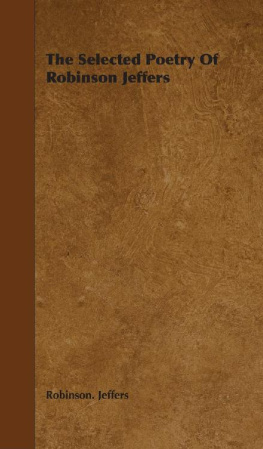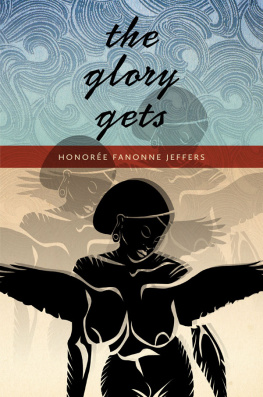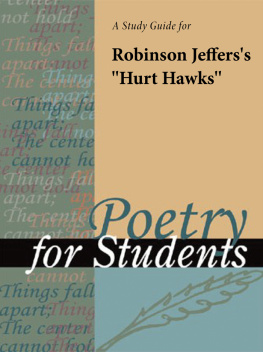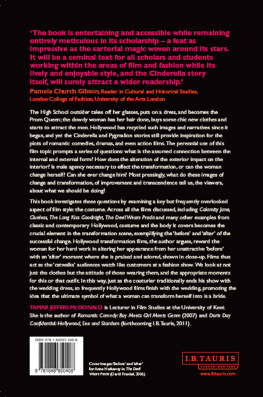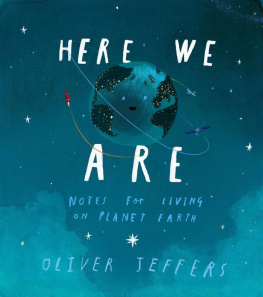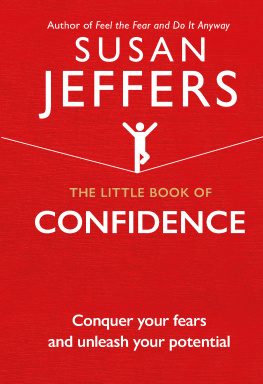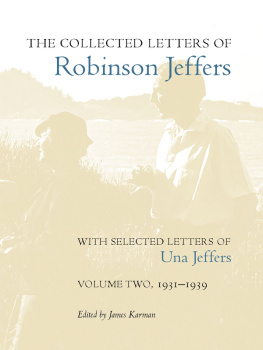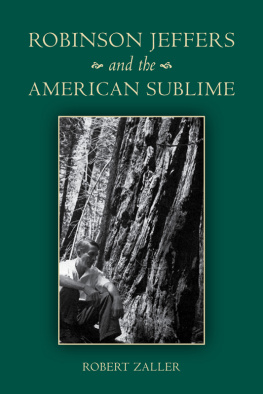Robinson Jeffers - The Selected Poetry of Robinson Jeffers
Here you can read online Robinson Jeffers - The Selected Poetry of Robinson Jeffers full text of the book (entire story) in english for free. Download pdf and epub, get meaning, cover and reviews about this ebook. year: 2013, publisher: Read Books Ltd., genre: Art. Description of the work, (preface) as well as reviews are available. Best literature library LitArk.com created for fans of good reading and offers a wide selection of genres:
Romance novel
Science fiction
Adventure
Detective
Science
History
Home and family
Prose
Art
Politics
Computer
Non-fiction
Religion
Business
Children
Humor
Choose a favorite category and find really read worthwhile books. Enjoy immersion in the world of imagination, feel the emotions of the characters or learn something new for yourself, make an fascinating discovery.
- Book:The Selected Poetry of Robinson Jeffers
- Author:
- Publisher:Read Books Ltd.
- Genre:
- Year:2013
- Rating:3 / 5
- Favourites:Add to favourites
- Your mark:
- 60
- 1
- 2
- 3
- 4
- 5
The Selected Poetry of Robinson Jeffers: summary, description and annotation
We offer to read an annotation, description, summary or preface (depends on what the author of the book "The Selected Poetry of Robinson Jeffers" wrote himself). If you haven't found the necessary information about the book — write in the comments, we will try to find it.
The Selected Poetry of Robinson Jeffers — read online for free the complete book (whole text) full work
Below is the text of the book, divided by pages. System saving the place of the last page read, allows you to conveniently read the book "The Selected Poetry of Robinson Jeffers" online for free, without having to search again every time where you left off. Put a bookmark, and you can go to the page where you finished reading at any time.
Font size:
Interval:
Bookmark:
THE SELECTED POETRY OF
ROBINSON JEFFERS
Poetry of
ROBINSON
JEFFERS
 TO UNA JEFFERS
TO UNA JEFFERS The omission of Cawdor is purely arbitrary and accidental; I had finally to choose between this and Thursos Landing; and there was no ground for choice; I simply drew lots in my mind. The arrangement of the book is merely chronological; the long poems are presented in the order of their writing, the short ones in groups as they were first published. The earliest of the long poems was written, I think, in 1921 and 1922; the earliest of the short ones in 1917. This is The Songs of the Dead Men to the Three Dancers choruses from a wartime playreprinted here only as a sample of the metrical experiments that occupied my mind for a while. A good friend of mine, who is also my publisher, wants me to turn this foreword to some account; he says that a number of people have written pro and con about my verses, and it is high time for the author himself to say something. Very likely.
But I do not wish to commend or defend them, though sufficiently attacked; and it seems to me that their meaning is not obscure. Perhaps a few notes about their origins may be of interest to anyone who is interested in the verses themselves. Long ago, before anything included here was written, it became evident to me that poetryif it was to survive at allmust reclaim some of the power and reality that it was so hastily surrendering to prose. The modern French poetry of that time, and the most modern of the English poetry, seemed to me thoroughly defeatist, as if poetry were in terror of prose, and desperately trying to save its soul from the victor by giving up its body. It was becoming slight and fantastic, abstract, unreal, eccentric; and was not even saving its soul, for these are generally anti-poetic qualities. It must reclaim substance and sense, and physical and psychological reality.
This feeling has been basic in my mind since then. It led me to write narrative poetry, and to draw subjects from contemporary life; to present aspects of life that modern poetry had generally avoided; and to attempt the expression of philosophic and scientific ideas in verse. It was not in my mind to open new fields for poetry, but only to reclaim old freedom. Still it was obvious that poetry and prose are different things; their provinces overlap, but must not be confused. Prose, of course, is free of all fields; it seemed to me, reading poetry and trying to write it, that poetry is bound to concern itself chiefly with permanent things and the permanent aspects of life. That was perhaps the great distinction between them, as regards subject and material.
Prose can discuss matters of the moment; poetry must deal with things that a reader two thousand years away could understand and be moved by. This excludes much of the circumstance of modern life, especially in the cities. Fashions, forms of machinery, the more complex social, financial, political adjustments, and so forth, are all ephemeral, exceptional; they exist but will never exist again. Poetry must concern itself with (relatively) permanent things. These have poetic value; the ephemeral has only news value. Another formative principle came to me from a phrase of Nietzsches: The poets? The poets lie too much.
I was nineteen when the phrase stuck in my mind; a dozen years passed before it worked effectively, and I decided not to tell lies in verse. Not to feign any emotion that I did not feel; not to pretend to believe in optimism or pessimism, or unreversible progress; not to say anything because it was popular, or generally accepted, or fashionable in intellectual circles, unless I myself believed it; and not to believe easily. These negatives limit the field; I am not recommending them but for my own occasions. Here are the principles that conditioned the verse in this book before it was written; but it would not have been written at all except for certain accidents that changed and directed my life. (Some kind of verse I should have written, of course, but not this kind.) The first of these accidents was my meeting with the woman to whom this book is dedicated, and her influence, constant since that time. My nature is cold and undiscriminating; she excited and focused it, gave it eyes and nerves and sympathies.
She never saw any of my poems until they were finished and typed, yet by her presence and conversation she has co-authored every one of them. Sometimes I think there must be some value in them, if only for that reason. She is more like a woman in a Scotch ballad, passionate, untamed and rather heroicor like a falconthan like any ordinary person. A second piece of pure accident brought us to the Monterey coast mountains, where for the first time in my life I could see people livingamid magnificent unspoiled seeneryessentially as they did in the Idyls or the Sagas, or in Homers Ithaca. Here was life purged of its ephemeral accretions. Men were riding after cattle, or plowing the headland, hovered by white sea-gulls, as they have done for thousands of years, and will for thousands of years to come.
Here was contemporary life that was also permanent life; and not shut from the modern world but conscious of it and related to it; capable of expressing its spirit, but unencumbered by the mass of poetically irrelevant details and complexities that make a civilization. By this time I was nearing thirty, and still a whole series of accidents was required to stir my lazy energies to the point of writing verse that seemed to bewhether good or badat least my own voice. So much for the book as a whole: a few notes may be added as to the origins of particular poems. Tamar grew up from the biblical story, mixed with a reminiscence of Shelleys Cenci, and from the strange, introverted and storm-twisted beauty of Point Lobos. Roan Stallion originated from an abandoned cabin that we discovered in a roadless hollow of the hills. When later we asked about its history no one was able to tell us anything except that the place had been abandoned ever since its owner was killed by a stallion.
This is the only one of my poems of which I can remember clearly the moment of conception. I had just finished The Tower Beyond Tragedy and was looking about for another subjectwhich was to be contemporary, because I repented of using a Greek story when there were so many new ones at hand. I was quarrying granite under the sea-cliff to build our house with, and slacking on the job sat down on a wet rock to look at the sunset and think about my next poem. The stallion and the desolate cabin came to mind; then immediately, for persons of the drama, came the Indian woman and her white husband, real persons whom I had often seen driving through our village in a ramshackle buggy. The episode of the woman swimming her horse through a storm-swollen ford at night came also; it was part of her actual history....
Font size:
Interval:
Bookmark:
Similar books «The Selected Poetry of Robinson Jeffers»
Look at similar books to The Selected Poetry of Robinson Jeffers. We have selected literature similar in name and meaning in the hope of providing readers with more options to find new, interesting, not yet read works.
Discussion, reviews of the book The Selected Poetry of Robinson Jeffers and just readers' own opinions. Leave your comments, write what you think about the work, its meaning or the main characters. Specify what exactly you liked and what you didn't like, and why you think so.

